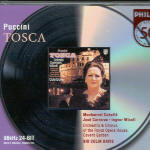All recordings of Tosca must yield pride of place to the benchmark Callas/de Sabata recording on EMI, but of the many, many versions that have come along since, this one certainly approaches that exalted standard, as do Price/Karajan and perhaps one or two others. You get Montserrat Caballé in her absolute prime, offering both dramatic involvement and gorgeous tone. Puccini thought that Tosca’s big Act 2 aria, Vissi d’arte, held up the action. Here you wish it would never stop. The young José Carreras pours out torrents of heroic sound, and if Ingvar Wixell doesn’t offer Gobbi’s subtlety as Scarpia, he’s never crude, and his sadism always wears a silken glove, vocally.
Colin Davis’ contribution underlines the music’s richness of texture without inhibiting dramatic momentum, and the Covent Garden orchestra plays beautifully. Always well recorded, this new remastering offers little, if any, improvement. And so this performance goes from full price with libretto, to a budget-priced twofer with no texts at all, to mid-price with two booklets in four languages. All things considered this is its best deal yet, which is more than can be said for many other issues in the Philips 50 series.
































